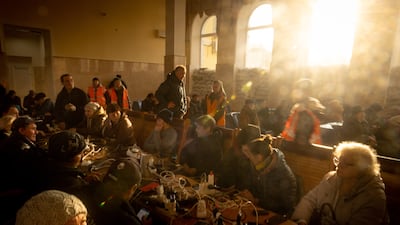Parts of Ukraine are sending residents away to ensure that energy supplies do not collapse over the winter and that people are protected from hardship.
Authorities in recently retaken provinces started evacuating civilians on Monday, recognising that the damage to infrastructure was too severe to serve the local population. The move came a day after one of the country's biggest energy firms said a spell abroad would stave off shortages nationwide.
"If they can find an alternative place to stay for another three or four months, it will be very helpful to the system," Maxim Timchenko, DTEK chief executive. "If you consume less, then hospitals with injured soldiers will have guaranteed power supply. This is how it can be explained that by consuming less or leaving, they also contribute to other people."
In 15 Ukrainian regions, four-hour or longer power cuts were expected Monday, said Volodymyr Kudrytsky, head of Ukraine’s state grid operator Ukrenergo. More than 40 per cent of the country’s energy facilities have been damaged by Russian missile strikes in recent weeks.
Recently liberated areas of Kherson and Mykolaiv, which has been regularly shelled in the past few months by Russian forces, were advised to move to safer areas in central and western parts of the country, said Ukraine’s Deputy Prime Minister Iryna Vereshchuk.
She added the government would provide “transportation, accommodation and medical care" for those relocated. The evacuations come just over a week after Ukraine retook the city of Kherson and areas around it. The liberation marked a major battlefield gain, while the evacuations now highlight the difficulties the country is facing following heavy Russian shelling of its power infrastructure as winter weather sets in.

Russia has been pounding Ukraine's power grid and other infrastructure from the air, causing widespread blackouts and leaving millions of Ukrainians without heat, power or water as frigid cold and snow blankets the capital Kyiv and other cities.
On Sunday, powerful explosions from shelling shook Ukraine’s Zaporizhzhia region, the site of Europe’s largest nuclear power plant. The IAEA, the global nuclear watchdog, called for “urgent measures to help prevent a nuclear accident” in the Russian-occupied compound.
Kyiv and Moscow blamed each other for the shelling that came after weeks of relative calm in the area that has been the site of fighting between Russian and Ukrainian forces since Russia invaded on February 24.
The fighting has raised the spectre of a nuclear catastrophe since Russian troops occupied the plant — Europe's largest — during the early days of the war.
Warning that power cuts could last anywhere from several hours to several days, the network said “resilience and courage are what we need this winter.”
Kyiv Mayor Vitali Klitschko also stressed the need to be ready and resilient in the face of a potential blackout: "Worst case scenario. Actually, I don't like to talk about that, but I have to be prepared if we [do not] have electricity, blackout, no water, no heating, no services and no communication," Klitschko told AP on Friday.
Ukrenergo said in a statement that “thousands of kilometres of key high-voltage lines are not working”, affecting the entire country.
It said there were dozens of damaged transformers in the power system and facilities with equipment that could not be replaced quickly.
President Volodymyr Zelenskyy said after last week’s strikes that more than 10 million Ukrainians had been left without electricity.
“The restoration of networks and technical supply capabilities, the demining of power transmission lines, repairs — everything goes on round the clock,” he said.


